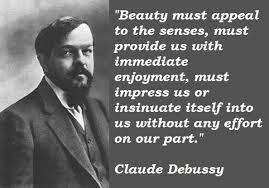I am currently accepting voice, piano, and violin students. Learn more or
The Happy Island
25 September 2014
Some pieces of music are like food to my soul. I can play them over and over again and never get tired of them. They evoke a response from me that usually involves silence and awe. I’m listening to one of them right now. L’isle Joyeuse (The Happy Island), is a composition for piano written by Claude Debussy. Trying to figure out exactly what the music means to me and verbalizing it is the hard part. That is the task ahead of me today. Before reading any further, take five minutes to listen to the recording I have posted above, played masterfully by Marc-Andre Hamelin. Otherwise, none of this will make much sense.
I have often tried to understand why this piece holds such an appeal for me. The only way I can describe the music is by using words like ethereal and frantically excited. I think the key to understanding the piece is its title, The Happy Island. You can’t stay on an island very long, you know. Resources begin to run out. Eventually, you have to move on. Happiness is kind of like that.
In its own unsettled way, The Happy Island is beautiful, a celebration of transitory happiness. It is an island we might meet once in a life time, surrounded by a sea of sadness, pain, and suffering.
I have an odd view about happiness. I suppose a fair amount of Christians would disagree with me. I do not believe happiness is the purpose of life, nor do I believe it is the perpetual state of Christians. Now joy! That’s a different thing entirely. People can go through great hardships while rejoicing in their Lord. But that’s another topic for another day. Happiness is different. Happiness is the seasoning of life. I suppose it could be a tiny glimpse of what we were created for and what we’ll find in eternity. But in this life, it is not meant to last. And something very odd and unsettling begins to happen when people cling to happiness as their mainstay. They do strange, selfish, and generally unethical things when their happiness is threatened. They’ll leave children and spouses to pursue a more fulfilling relationship. They’ll buy things until they can’t afford them anymore, then go into debt and buy more. They’ll cut people out of their lives to ensure their own comfort. In short, they’ll do whatever it takes. Instead of sailing to their happy island, thanking God for it however long it lasts and gracefully waving goodbye when He gives the word, they cling to it and only leave when forced, kicking and screaming.
As I began to read up on the circumstances around L’isle Joyeuse’s composition, I began to understand that this is exactly what Debussy’s life reflected when he wrote it. To say that Debussy’s life was a mess would be no overstatement. He carried on a string of affairs with various women, some married and some not, that began at the tender age of eighteen. He finally married one of them after she threatened to commit suicide if he did not. A great start to a marriage, no? The two were married for several years before discontentment came knocking. Debussy found his wife intellectually dull. She had prematurely aged and was unable to bare children. Again, in search of ever-elusive happiness, Debussy took up with a married woman, Emma Bardac. In 1904 they both left their respective spouses on the sly and vacationed on the island of Jersey. It was there that Debussy completed L’isle Joyeuse. No doubt, the brief time they spent together was quite happy, and a depiction of that happiness transferred to Debussy’s composition. But it was not to last. When they returned, Debussy made it known to his wife that their marriage was over. A few months later, she attempted suicide and failed. Still, all of Debussy’s friends and society in general learned of his infidelity after the incident, and life became very difficult for the pair. The two were eventually able to obtain divorces and marry, but as you can imagine, their marriage was tempestuous until the end, producing one daughter who died shortly after her parents succumbed to various illnesses.
Happiness…such a passing fancy, like our lives. We are born and live a few years that pass like the wind and then we die. How miserable we make ourselves and the people around us by clinging to those things that will never last! But if that is all there is, what other choice do we have? How tragic. We get little enough of either. Thankfully, life and happiness are not all. Each of us is given an immortal soul and access to an immortal God through Christ. How much better to develop and cultivate our souls and learn to know our God than to obsess over things that will run out and hopes that will inevitably disappoint?
When I listen to L’isle Joyeuse, I’m reminded of James 4:14, “…For what is your life? It is even a vapor, that appeareth for a little time, and then vanisheth away.” Life is fading fast like The Happy Island, giving way to eternity.
